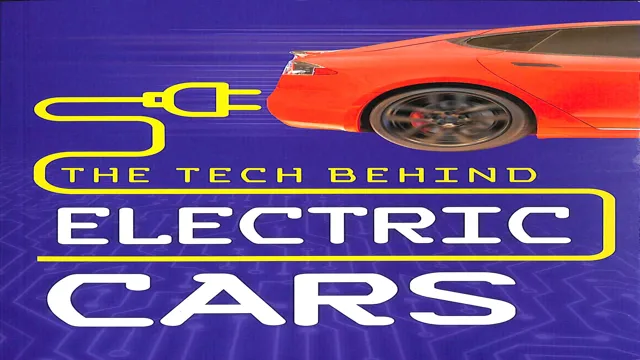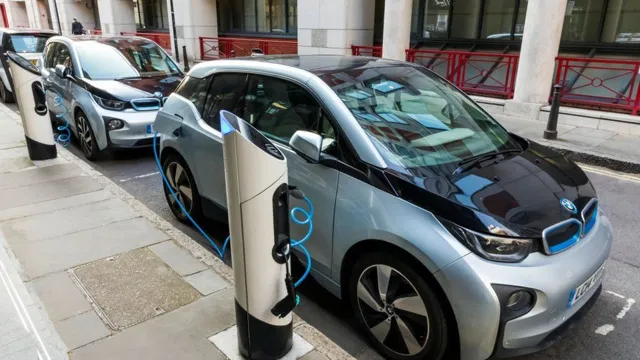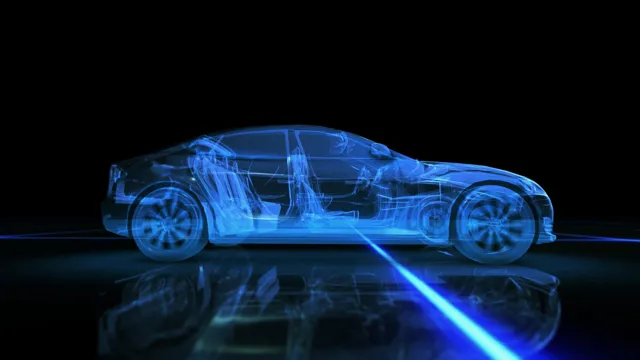The Electrifying Revolution: Unveiling the Advanced Technology Behind Electric Cars
Electric cars are gradually becoming more popular with each passing day. In the past, these vehicles were only a dream for most people. Fast forward to today, and various automakers are mass-producing electric cars of all shapes and sizes.
But, have you ever stopped to wonder about the technology behind them? How do electric cars work? What makes them unique? This blog post will delve into the nitty-gritty details of the technology behind electric cars to help you better understand this revolutionary mode of transportation. So, buckle up, and let’s explore what makes electric cars stand out in the world of automobiles.
What Are Electric Cars?
The technology behind the electric car is a fascinating development that is changing the automotive industry. At its core, an electric car is powered by batteries that produce electricity to propel the vehicle forward. These batteries are charged using an external power source, typically from a charging station or a plug-in outlet.
Compared to traditional combustion engines, electric cars are much more efficient and emit fewer greenhouse gases, making them a popular choice for environmentally conscious consumers. The technical aspects of an electric car may seem overwhelming, but they ultimately result in a smooth and quiet ride, with less maintenance costs in the long run. While electric cars are still relatively new, it is exciting to watch as the technology continues to grow and become more available to the public.
Electric cars vs. traditional cars
Electric cars vs traditional cars is an age-old debate that has gained significant attention in recent years. Electric cars, also known as EVs, are vehicles that run on electric batteries instead of gasoline or diesel fuel. They are also more energy-efficient and environmentally friendly than traditional vehicles.
In addition, electric cars are cheaper to maintain and have lower operating costs than their gas-powered counterparts. Despite these benefits, many consumers are still wary of electric cars due to factors such as high upfront costs, limited driving range, and lack of charging infrastructure. However, with advancements in technology and the increasing availability of charging stations, electric cars are becoming a more viable option for everyday consumers.
So, if you’re considering a new car purchase, it might be worthwhile to give electric vehicles a second look.

How do electric cars work?
Electric cars are vehicles that run on electricity rather than traditional fuels like gasoline or diesel. Unlike traditional gas-powered cars, electric cars rely on rechargeable batteries to power an electric motor that drives the wheels. The batteries are charged by plugging the car into an electrical outlet or a charging station, which can take several hours depending on the battery capacity and charging speed.
Some models also use regenerative braking, which converts the kinetic energy generated during braking into electrical energy to recharge the batteries. This makes electric cars a more environmentally friendly alternative to traditional cars since they produce zero emissions while driving. Electric cars also require less maintenance than traditional cars since they have fewer moving parts, and electric motors have a longer lifespan than combustion engines.
With advances in technology and increased adoption, electric cars are becoming more affordable and practical for everyday use, making them a viable option for those looking for a greener and more sustainable mode of transportation.
Electric Car Components
When it comes to the technology behind the electric car, there are several components at play. At the core of the vehicle is the battery, which stores and provides electricity to power the car’s electric motor. This electric motor uses the electricity to turn the car’s wheels, which makes it move.
The battery can be charged by plugging the car into an electric charging station or by regenerative braking, which converts the kinetic energy generated when the car slows down into electricity that can be used to charge the battery. Other essential components of an electric car include the inverter, which converts the DC electricity from the battery into AC electricity that the motor can use, and the charger, which controls how quickly the battery charges. The technology behind the electric car is continually evolving, and we can expect to see even more advanced components and features as electric cars become increasingly popular.
So, it’s essential to know about electric car components before heading to the showroom for making a purchase decision!
Battery packs
Battery packs are an essential component of electric cars. They are responsible for storing and delivering energy to power the vehicle’s electric motor. A battery pack typically consists of several individual battery cells that work together to provide the power required for the car to run.
The size and capacity of the battery pack determine the driving range of the electric car, and therefore, it is one of the most crucial aspects to consider when purchasing an electric car. The battery packs come in different sizes, designs, and chemistries, each with its advantages and disadvantages. Lithium-ion batteries are the most commonly used battery chemistry because of their high energy density and long lifespan.
These batteries can be recharged quickly, and they can last for up to a decade. However, they are also expensive to manufacture and can be volatile if not handled correctly. Electric car manufacturers continue to invest in research and development, hoping to make battery packs more efficient, cost-effective, and sustainable.
As technology advances, we can expect to see significant improvements in battery pack performance, reducing the cost of electric cars and making them a more accessible transportation alternative for everyone.
Electric motor
Electric motor When it comes to electric car components, the electric motor is certainly one of the most important. It’s responsible for powering the vehicle and converting electrical energy into mechanical energy to move the wheels. Electric cars typically use AC induction motors, which work by using magnetic fields to rotate a rotor inside a stator.
The rotor is attached to the wheels and spins as the magnetic field changes. The speed of the motor is controlled by the frequency of the AC current, which is usually managed by an inverter. Electric motors are incredibly efficient and can provide instant torque, making them perfect for quick acceleration.
They require very little maintenance and can last for many years without needing any major repairs. Overall, the electric motor is an essential component of any electric vehicle and is undoubtedly one of the main reasons why they are becoming so popular among both consumers and automakers alike.
Power electronics
Electric car components are powered by advanced power electronics technologies that convert the direct current (DC) stored in batteries into the alternating current (AC) needed to power the electric motor. The major components of an electric car include the battery, motor, inverter, charger, and cooling systems. The battery stores energy and powers the electric motor, while the motor converts electrical energy into mechanical energy that propels the vehicle forward.
The inverter controls the amount and direction of electricity flowing between the battery and the motor, while the charger replenishes the battery’s energy levels. The cooling system regulates the temperature of the electric car components and prevents overheating. Power electronics play a vital role in electric car performance, efficiency, and safety.
The use of advanced power electronics technologies is rapidly transforming the electric vehicle industry and contributing to the transition to a cleaner, more sustainable energy system. Therefore, investing in the research and development of innovative power electronics technologies is crucial for the future success of the electric vehicle industry.
Charging an Electric Car
When it comes to electric cars, one of the most crucial aspects is charging. Without the ability to charge efficiently, electric cars will not be able to reach their full potential. The technology behind charging an electric car is based on two main methods: AC and DC charging.
AC charging, also known as Level 2 charging, is the most commonly used method for charging electric vehicles at home. It is a slower method, with charging times that range from 3 to 8 hours. On the other hand, DC fast charging is a quicker method, allowing EVs to charge to 80% capacity in as little as 30 minutes.
The speed of charging is due to the high level of energy that can be transferred at once. Charging an electric car is a simple process; plug in the charger, wait for the car to charge, and unplug. Advances in technology have made charging electric cars more convenient, with the introduction of wireless charging pads and apps that allow drivers to locate the nearest charging station.
With the increasing popularity of electric cars, the technology behind charging is only going to get better, making EV ownership more accessible and convenient for everyone.
Types of chargers
Charging an electric car requires a charger that converts the AC current from the power grid to DC current that the car’s battery can store. There are two main types of chargers: Level 2 and Level Level 2 chargers are the most common and can provide up to 25 miles of range per hour of charging.
These chargers can be installed in homes or public spaces and usually require several hours to fully charge an electric car. Level 3 chargers, also known as DC fast chargers, are less common but can provide up to 80 miles of range in just 20 minutes of charging. These chargers are typically found along highways or in commercial areas and require specialized equipment to use.
It’s important to have a charging plan in place before hitting the road with an electric car to ensure a smooth and stress-free journey.
Charging time and range
Charging time and range are important factors to consider when it comes to owning an electric car. Unlike a traditional gasoline car, electric cars need to be plugged in and charged. The time it takes for an electric car to fully charge depends on the type of charger and the car’s battery capacity.
Generally, the average time for a full charge can range from 30 minutes to 12 hours. It’s important to plan ahead and ensure that you have enough time to charge your car before embarking on a long journey. Additionally, the range of an electric car refers to the distance it can travel on a single charge.
This can vary depending on the make and model of the car, as well as driving conditions and speed. For example, a Tesla Model S has a range of up to 373 miles on a full charge, while a Nissan Leaf has a range of up to 226 miles on a single charge. It’s important to consider both charging time and the range when deciding if an electric car is right for you and your lifestyle.
Future of Electric Cars
The future of electric cars is fast approaching, and the technology behind them is advancing at an impressive rate. The core technology behind electric cars is the battery, which allows the car to be powered without any emissions. Lithium-ion batteries are the most commonly used type of battery today, but researchers are constantly working on improving their efficiency and durability.
The charging infrastructure is also rapidly evolving, with more charging stations being built every day, making it easier for electric car owners to travel long distances. Another exciting development is the use of regenerative braking, which captures energy normally lost during braking to recharge the battery, maximizing the car’s range. With advancements in technology and more and more car manufacturers investing heavily in electric cars, the future looks bright for this eco-friendly mode of transportation.
Conclusion
In conclusion, the technology behind the electric car is a powerful integration of innovation and ingenuity. From high-performance batteries to advanced motor control systems, each component plays a crucial role in the success of this game-changing vehicle. By harnessing the power of electricity, we are able to unlock a new era of sustainable transportation, providing a cleaner, quieter, and more efficient solution for the future.
It’s like harnessing the power of lightning to create a sustainable, futuristic mode of transportation that not only saves you money but also saves the planet. So whether you’re a car enthusiast or a sustainability advocate, the electric car has something for everyone, and it’s definitely a ride worth taking.”
FAQs
What is the technology behind the electric car?
The technology behind the electric car involves the use of rechargeable batteries to power an electric motor instead of using petrol or diesel as in traditional cars.
How does the electric car differ from traditional cars?
The electric car differs from traditional cars in that it uses an electric motor instead of an internal combustion engine, and it is powered by electricity from batteries instead of petrol or diesel.
What are the advantages of using an electric car?
Electric cars are environmentally friendly, produce fewer emissions than traditional cars, require less maintenance, and offer a more comfortable and quieter driving experience.
How long does it take to charge an electric car?
The time it takes to charge an electric car depends on the battery size and the charging method used. Typically, it takes about 30 minutes to an hour to charge an electric car at a fast-charging station, while a full charge at home using a standard wall socket may take several hours.






